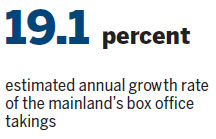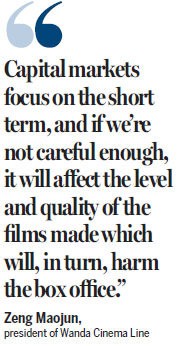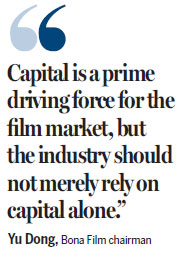Mainland movie market in the throes of a 'capital feast'
Updated: 2016-06-21 08:07
By Lin Wenjie in Hong Kong(HK Edition)
|
|||||||
|
A man walks past movie posters in a mainland cinema. Industry experts have allayed worries that there may be a bubble in the mainland's red-hot film industry. Provided to China Daily |
Shrugging off a dismal box office performance in North America, where it was met with negative reviews, Warcraft - the movie adapted from the famous computer game - has stormed the Chinese mainland, having grossed 1.35 billion yuan ($201 million) since it opened at mainland theaters nearly two weeks ago.
This dwarfs the mere $37 million raked in after the film's 10-day showing in theaters across the North America.
Warcraft, which currently ranks sixth in box office takings among imported movies on the mainland, was co-produced by Legendary Entertainment, which was bought by mainland conglomerate Dalian Wanda Group for $3.5 billion in January this year.
Huayi Brothers Media Corp - one of China's biggest film groups - and mainland social media giant Tencent also took a share of the profits.

While entertainment juggernauts are busy scouring for global deals, many smaller market players are seen to have been hit by a dearth of talent, and have been struggling to keep themselves afloat.
"Many filmmakers are complaining about the difficulties in finding talented actors and directors, coupled with risky investments," says Zhang Qiang, chief executive of Alibaba Pictures Group.
Alibaba Pictures Group - the entertainment unit of e-commerce giant Alibaba Group - aims to serve both key and smaller partners in the movie and television entertainment industry, and plans to build up various internet-based platforms that can link up different resources to solve the problems confronting them, and enhance efficiency in movie production.
Earlier this year, the group struck up partnerships with 13 filmmakers to produce 17 movies and two television series, and vowed to set up an online financing platform for small- and medium-sized filmmakers to shorten the payment cycle. The company will also promote sales of derivative goods through another platform, with a vision to change the traditional film business model which mainly relies on the box office.

Zhang said in Shanghai the company will share big data collected by its online platforms with offline cinemas, and help cinemas build up an internet-based membership management system.
As for the online ticketing platform, data generated, such as the ticketing habits of the majority of cinema goers, will help filmmakers and cinemas understand their audiences better, and enable them to adjust strategies in film promotion and distribution.
The proliferation of the mainland's film industry has turned the red-hot sector into one of the most robust deal-making landscapes.
According to information provider Wind, mergers and acquisitions among mainland enterprises in the film and entertainment industry have hit 125 deals since last year, with the combined value of deals exceeding 92.7 billion yuan.
As Zhang put it, the "capital feast" has just begun.
However, some industry leaders have expressed reservations. "While it's the best of times, it's also the worst of times," Bona Film Chairman Yu Dong told a forum at the Shanghai International Film Festival earlier this month.
"Capital is a prime driving force for the film market, but the industry should not merely rely on capital alone," he said.
Zeng Maojun, president of Wanda Cinema Line - a cinema operator under Dalian Wanda Group - pointed to some of the distortions in the industry resulting from a capital surge. "Capital markets focus on the short term, and if we're not careful enough, it will affect the level and quality of the films made which will, in turn, harm the box office."
He also hit out at those bent on harming the industry, citing some of the fraudulent manipulations of box office takings earlier this year.

Beijing Max Screen, the distributor of martial arts film IP Man 3, admitted having purchased 56 million yuan worth of tickets to inflate box office takings to attract investments for the company on a peer-to-peer platform, according to a mainland media report in March. As punishment, Max Screen's distribution license was suspended for one month and had 32 million yuan in false receipts subtracted from Ip Man 3's box office total.
With more capital entering the market, some investors are wondering whether a bubble has formed in the film market. But, Zhang denied that a bubble, if any, is about to pop. "There're bubbles in the capital markets, not at the box office," he reckoned.
Zeng chipped in: "It's still too early to worry about a bubble," adding that the mainland's film market is far from being saturated.
In his view, the mainland can accommodate up between 110,000 and 120,000 movie screens. "The number of movie screens in the country at present is below 40,000. So, it's reasonable for the mainland to have about 80,000 movie screens. The growth in the number of movie screens will only start to slow if the figure exceeds 70,000."
According to a report by international accounting firm PricewaterhouseCoopers earlier this month, the mainland's film industry is expected to be crowned the world's largest - reaching $10.3 billion by next year and surpassing that of the US.
It's estimated that, with an annual growth rate of 19.1 percent, China's box office takings are expected to hit $15.08 billion by 2020, accounting for nearly one-third of the world's box office earnings.
cherrylin@chinadailyhk.com
(HK Edition 06/21/2016 page9)
